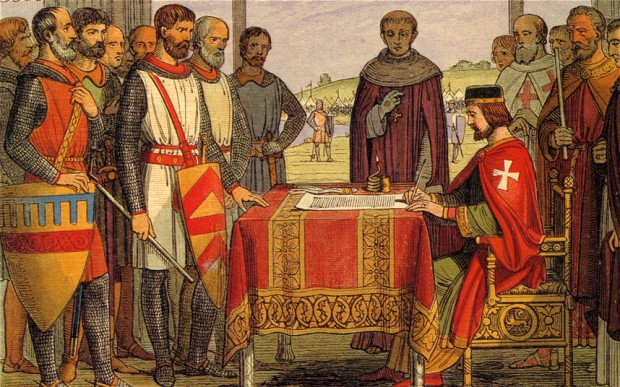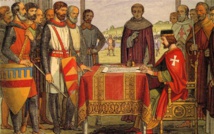In June 1215, the despotic king John accepted the demands of rebellious barons to curb his powers and agreed the charter at Runnymede, a meadow by the River Thames west of London. Copies were written out and sent around the country.
At the British Library in London, the two priceless originals held by the institution were joined by those from Lincoln and Salisbury Cathedrals for a unification event this week that few will get to witness.
A total of 1,215 people -- drawn from a ballot of more than 40,000 people from 20-plus countries -- have won the chance to see the four originals together on Tuesday. World-leading Magna Carta experts get the chance to study them side by side on Wednesday.
"Today is a really exciting day: the first time ever we have brought together the four surviving original copies of Magna Carta," Claire Breay, the library's head of medieval manuscripts, told AFP.
"It established that the king was subject to the law and it's been used in the centuries since it was granted as a defence against arbitrary and unjust rulers.
"And, of course, it has enormous symbolic importance as a symbol of rights and justice and freedom around the world."
- Principles fuelled Arab Spring -
With each copy framed in individual glass cases, the four manuscripts were installed together in a thick glass cabinet on Sunday in the British Library's Treasures gallery.
The handwritten Latin script can be studied in the low light.
Just three of the 63 clauses remain in English law, and nearly a third of the text was dropped or substantially rewritten within 10 years of being drawn up.
However, the principles that justice should be available to all, the law applies equally to all and leaders can only exercise power in accordance with the law continue to resonate around the world.
"No free man shall be seized or imprisoned, or stripped of his rights or possessions, or outlawed or exiled, or deprived of his standing in any way... except by the lawful Judgment of his equals or by the law of the land," it states.
"To no one will we sell, to no one deny or delay right or justice."
The Magna Carta Trust, which looks after the memorial site in Runnymede, believes the charter's importance is growing.
"800 years on, Magna Carta's best days lie ahead," it said.
"As an idea of freedom, democracy and the rule of law, it is lapping against the shores of despotism.
"The principles set out in Magna Carta have driven the Arab Spring and the continuing protests against despotism around the world."
- 'Birth certificate of democracy' -
The four parchments will be moved to parliament for a private display Thursday, before returning to their respective homes for a year of celebrations.
The Very Reverend Philip Buckler, Dean of Lincoln Cathedral, said there could have been between 13 and more than 30 original Magna Carta copies.
The cleric called it "the birth certificate of democracy, the grandparent of constitutions".
"Nobody is above the law. It's as relevant today as it was then," he told AFP.
The Salisbury copy spent centuries locked in a wooden chest and has never before left the southwestern city.
The Very Reverend June Osborne, Dean of Salisbury, said the cathedral, as guardian of one of the copies, continually asks "what can we do to build a society that would be proud of calling itself a Magna Carta society?"
Events are being held across England throughout 2015 to mark the anniversary, including a national peal of bells and a major international commemoration event at Runnymede on June 15.
-------------------------------------------------------------------------------------------------
At the British Library in London, the two priceless originals held by the institution were joined by those from Lincoln and Salisbury Cathedrals for a unification event this week that few will get to witness.
A total of 1,215 people -- drawn from a ballot of more than 40,000 people from 20-plus countries -- have won the chance to see the four originals together on Tuesday. World-leading Magna Carta experts get the chance to study them side by side on Wednesday.
"Today is a really exciting day: the first time ever we have brought together the four surviving original copies of Magna Carta," Claire Breay, the library's head of medieval manuscripts, told AFP.
"It established that the king was subject to the law and it's been used in the centuries since it was granted as a defence against arbitrary and unjust rulers.
"And, of course, it has enormous symbolic importance as a symbol of rights and justice and freedom around the world."
- Principles fuelled Arab Spring -
With each copy framed in individual glass cases, the four manuscripts were installed together in a thick glass cabinet on Sunday in the British Library's Treasures gallery.
The handwritten Latin script can be studied in the low light.
Just three of the 63 clauses remain in English law, and nearly a third of the text was dropped or substantially rewritten within 10 years of being drawn up.
However, the principles that justice should be available to all, the law applies equally to all and leaders can only exercise power in accordance with the law continue to resonate around the world.
"No free man shall be seized or imprisoned, or stripped of his rights or possessions, or outlawed or exiled, or deprived of his standing in any way... except by the lawful Judgment of his equals or by the law of the land," it states.
"To no one will we sell, to no one deny or delay right or justice."
The Magna Carta Trust, which looks after the memorial site in Runnymede, believes the charter's importance is growing.
"800 years on, Magna Carta's best days lie ahead," it said.
"As an idea of freedom, democracy and the rule of law, it is lapping against the shores of despotism.
"The principles set out in Magna Carta have driven the Arab Spring and the continuing protests against despotism around the world."
- 'Birth certificate of democracy' -
The four parchments will be moved to parliament for a private display Thursday, before returning to their respective homes for a year of celebrations.
The Very Reverend Philip Buckler, Dean of Lincoln Cathedral, said there could have been between 13 and more than 30 original Magna Carta copies.
The cleric called it "the birth certificate of democracy, the grandparent of constitutions".
"Nobody is above the law. It's as relevant today as it was then," he told AFP.
The Salisbury copy spent centuries locked in a wooden chest and has never before left the southwestern city.
The Very Reverend June Osborne, Dean of Salisbury, said the cathedral, as guardian of one of the copies, continually asks "what can we do to build a society that would be proud of calling itself a Magna Carta society?"
Events are being held across England throughout 2015 to mark the anniversary, including a national peal of bells and a major international commemoration event at Runnymede on June 15.
-------------------------------------------------------------------------------------------------









 Home
Home Politics
Politics











